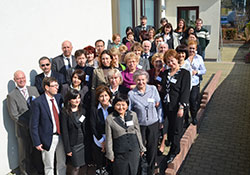First joint meeting for measles and rubella network laboratories from Russian Federation and newly independent states

WHO
WHO/Europe together with the Institute of Immunology of Luxembourg organized for the first time a joint meeting for the national and subnational reference laboratories involved in measles and rubella surveillance in the Russian Federation and newly independent states (NIS). The meeting, held on 14-16 March 2012 in Luxembourg, brought together 27 heads of laboratories from the Russian Federation and NIS, as well as delegates from WHO/Europe and representatives from the Institute of Immunology of Luxembourg. It gave participants a chance to share their experiences with laboratory surveillance and also offered an opportunity to exchange information on laboratory performance. The Government of Luxembourg funded the meeting through the Ministry of Foreign Affairs and Ministry of Health.
The meeting participants recognized the need for sustained vigilance in monitoring the transmission of measles and rubella viruses, despite ongoing efforts by the Russian Federation and NIS to control these diseases. Genotype information can help define pockets of susceptible individuals. However, more genotype information is needed, particularly in terms of rubella, in order to fully understand the transmission patterns of the viruses. Seroprevalence data showed that various cohorts remain vulnerable, particularly for measles exposure, and this information forms the basis for initiating corrective measures in closing the vaccination gaps. The laboratory surveillance data generated in the network is strong, i.e. more than 80% of reporting is timely and complete and more than 80% of sporadic cases result in a laboratory investigation. All laboratories have complied fully with the performance indicators set forward in the WHO accreditation program.
The group recognized the challenges of specimen transportation within countries and, more profoundly, across borders. Collectively, meeting participants emphasized the need for national authorities to work with the laboratories to facilitate specimen transportation. Alternative sample collection methods, including dried clinical samples like blood, serum, urine or nasal aspirates on filter paper for serological or virological investigation, are now being implemented.
In summary, the WHO measles-rubella laboratory network in the Russian Federation and NIS functions well, laboratories are all accredited by WHO and the level of performance is good, although challenges do exist.



